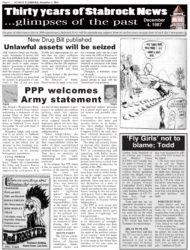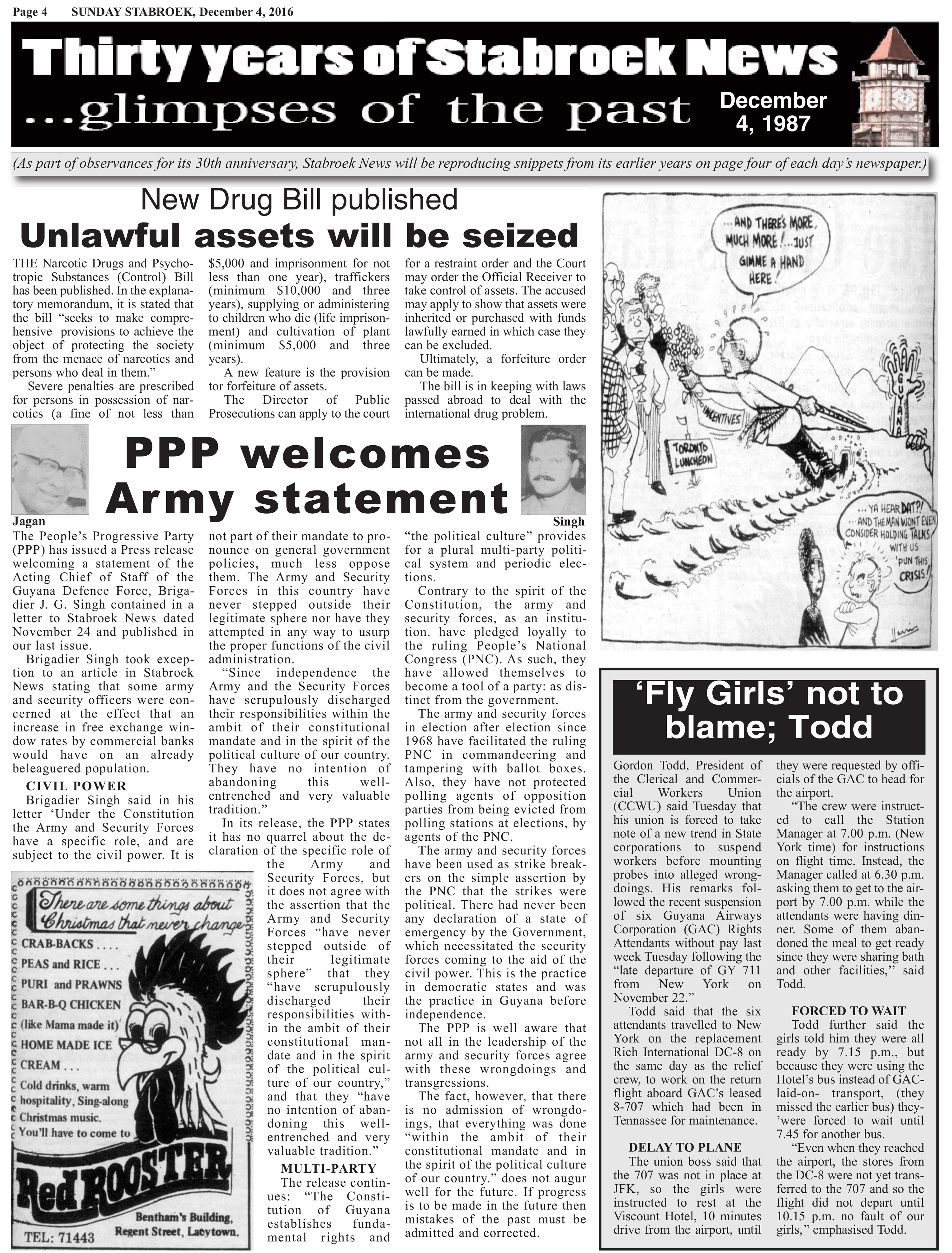First Published: December 4, 1987.
THE Narcotic Drugs and Psychotropic Substances (Control) Bill has been published. In the explanatory memorandum, it is stated that the bill “seeks to make comaprehensive provisions to achieve the object of protecting the society from the menace of narcotics and persons who deal in them.”
Severe penalties are prescribed for persons in possession of narcotics (a fine of not less than $5,000 and imprisonment for not less than one year), traffickers (minimum $10,000 and three years), supplying or administering to children who die (life imprisonment) and cultivation of plant (minimum $5,000 and three years).
A new feature is the provision tor forfeiture of assets.
The Director of Public Prosecutions can apply to the court for a restraint order and the Court may order the Official Receiver to take control of assets. The accused may apply to show that assets were inherited or purchased with funds lawfully earned in which case they can be excluded.
Ultimately, a forfeiture order can be made.
The bill is in keeping with laws passed abroad to deal with the international drug problem.
PPP welcomes Army statement
The People’s Progressive Party (PPP) has issued a Press release welcoming a statement of the Acting Chief of Staff of the Guyana Defence Force, Brigadier J. G. Singh contained in a letter to Stabroek News dated November 24 and published in our last issue.
Brigadier Singh took exception to an article in Stabroek News stating that some army and security officers were concerned at the effect that an increase in free exchange window rates by commercial banks would have on an already beleaguered population.
CIVIL POWER
Brigadier Singh said in his letter ‘Under the Constitution the Army and Security Forces have a specific role, and are subject to the civil power. It is not part of their mandate to pronounce on general government policies, much less oppose them. The Army and Security Forces in this country have never stepped outside their legitimate sphere nor have they attempted in any way to usurp the proper functions of the civil administration.
“Since independence the Army and the Security Forces have scrupulously discharged their responsibilities within the ambit of their constitutional mandate and in the spirit of the political culture of our country. They have no intention of abandoning this well-entrenched and very valuable tradition.”
In its release, the PPP states it has no quarrel about the declaration of the specific role of the Army and Security Forces, but it does not agree with the assertion that the Army and Security Forces “have never stepped outside of their legitimate sphere” that they “have scrupulously discharged their responsibilities within the ambit of their constitutional mandate and in the spirit of the political culture of our country,” and that they “have no intention of abandoning this well- entrenched and very valuable tradition.”
MULTI-PARTY
The release continues: “The Constitution of Guyana establishes fundamental rights and “the political culture” provides for a plural multi-party political system and periodic elections.
Contrary to the spirit of the Constitution, the army and security forces, as an institution. have pledged loyally to the ruling People’s National Congress (PNC). As such, they have allowed themselves to become a tool of a party: as distinct from the government.
The army and security forces in election after election since 1968 have facilitated the ruling PNC in commandeering and tampering with ballot boxes. Also, they have not protected polling agents of opposition parties from being evicted from polling stations at elections, by agents of the PNC.
The army and security forces have been used as strike breakers on the simple assertion by the PNC that the strikes were political. There had never been any declaration of a state of emergency by the Government, which necessitated the security forces coming to the aid of the civil power. This is the practice in democratic states and was the practice in Guyana before independence.
The PPP is well aware that not all in the leadership of the army and security forces agree with these wrongdoings and transgressions.
The fact, however, that there is no admission of wrongdoings, that everything was done “within the ambit of their constitutional mandate and in the spirit of the political culture of our country.” does not augur well for the future. If progress is to be made in the future then mistakes of the past must be admitted and corrected.
‘Fly Girls’ not to blame; Todd
 Gordon Todd, President of the Clerical and Commercial Workers Union (CCWU) said Tuesday that his union is forced to take note of a new trend in State corporations to suspend workers before mounting probes into alleged wrongdoings. His remarks followed the recent suspension of six Guyana Airways Corporation (GAC) Rights Attendants without pay last week Tuesday following the “late departure of GY 711 from New York on November 22.”
Gordon Todd, President of the Clerical and Commercial Workers Union (CCWU) said Tuesday that his union is forced to take note of a new trend in State corporations to suspend workers before mounting probes into alleged wrongdoings. His remarks followed the recent suspension of six Guyana Airways Corporation (GAC) Rights Attendants without pay last week Tuesday following the “late departure of GY 711 from New York on November 22.”
Todd said that the six attendants travelled to New York on the replacement Rich International DC-8 on the same day as the relief crew, to work on the return flight aboard GAC’s leased 8-707 which had been in Tennassee for maintenance.
DELAY TO PLANE
The union boss said that the 707 was not in place at JFK, so the girls were instructed to rest at the Viscount Hotel, 10 minutes drive from the airport, until they were requested by officials of the GAC to head for the airport.
“The crew were instructed to call the Station Manager at 7.00 p.m. (New York time) for instructions on flight time. Instead, the Manager called at 6.30 p.m. asking them to get to the airport by 7.00 p.m. while the attendants were having dinner. Some of them abandoned the meal to get ready since they were sharing bath and other facilities,’’ said Todd.
FORCED TO WAIT
Todd further said the girls told him they were all ready by 7.15 p.m., but because they were using the Hotel’s bus instead of GAC-laid-on- transport, (they missed the earlier bus) they-’were forced to wait until 7.45 for another bus.
“Even when they reached the airport, the stores from the DC-8 were not yet transferred to the 707 and so the flight did not depart until 10.15 p.m. no fault of our girls,’’ emphasised Todd.





